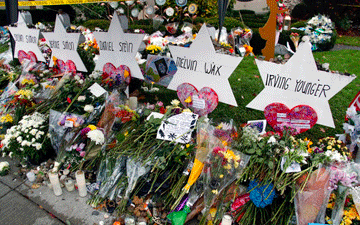
(AP Photo/Gene J. Puskar)
This article was originally published in MarketWatch on November 13, 2018.
Ann Skeet is the senior director of Leadership Ethics at the Markkula Center of Applied Ethics. Views are her own.
“Playing one’s position” is a practice of ethical leadership, in which someone is relentless about the set of interests they are obligated to uphold in the role they are in. The first-response of a doctor to the mass shooting at the Tree of Life Synagogue in Pittsburgh last month offers a strong example of the importance of playing one’s position in our lives and professions at all times.
Dr. Jeffrey Cohen lives across the street from Tree of Life and is a member of the synagogue. The decisions he made as the shooting occurred teach us about the dilemmas those in formal leadership positions face, and indeed that all of us face — since everyone has moments where we lead ourselves and others.
On that terrible Saturday, Cohen and his daughter first heard odd sounds, which he ignored initially. But his daughter, concerned, called to him, and he responded. As a father and a husband, he comforted his frightened family. He checked on his mother-in-law, who often attends the services at Tree of Life and found with great relief that she was not there.
Once he had accounted for his family members, Cohen went to check on the events unfolding as a neighbor and synagogue member. He was grateful for the first responders putting themselves in harm’s way as they entered the building. He offered his assistance as a bystander might and added to it his professional capabilities as a medical doctor.
Cohen shifted next to his responsibilities as the president of a local hospital, alerting his own hospital and several others to prepare for mass casualties. A nurse, the son of a rabbi, in his own hospital responded to that call and reported to work. Sadly, 11 worshippers shot at the temple were already dead.
The nurse, called to work for the mass casualty event, found himself treating the shooter, setting up the ironic reality of a Jewish nurse tending to a man who had gone to kill people because they were Jewish. Cohen, in his role as hospital president, commended his staff on their response and care of the shooter, noting that this is what health care providers do — they care for people regardless of the circumstances.
Later, Cohen would visit the shooter to assess the care he was being provided and assure the patient it would continue. When asked by a reporter to comment on the nature of the shooter’s wounds, Cohen declined, presumably fulfilling his obligation to protect the privacy of his patient.
Cohen did comment, though, about the compassion he felt for the man who had done the shootings. He said he thought the shooter was confused, that he listened to the “noise” and that the noise was telling the shooter that his people were being slaughtered. Cohen also said, “It’s time for leaders to lead…that words mean things and the words are leading to people doing things like this and I find it appalling.”
Cohen led through his words and actions. At every juncture, he correctly assessed the interests he needed to prioritize in the moment, as the circumstances revealed themselves to him.
Many people toggle back and forth between roles they hold as family members, neighbors, community members, professionals, and institutional leaders. On this day, Cohen had to make decisions in every one of those roles. Each time he assessed and correctly prioritized needs — those of his family, his neighbors and synagogue, the first responders, the network of hospitals, his own hospital and its employees, his patient, and a nation trying to make sense of a horrific experience — he was playing his position. Cohen chose to be true to his own values and to the professional code of conduct he committed to as a doctor, and to accept that circumstances had thrust him into a moment where he could offer leadership more broadly.
We are not all always capable of playing position as well as Dr. Cohen did. If we are tired, sick, or scared ourselves, it can be challenging to do so. In the realm of self-care, Cohen decided to go to a Pittsburgh Steelers football game in an effort to return to some normal life. His caregiving conversation with the shooter occurred after that game.
Had Cohen needed more than a football game to refresh and renew himself, one avenue would have been to recognize his limitations and ask for help. This sounds simple, but it can be one of the most challenging decision points for leaders traditionally used to responding fully. For people who have served in leadership positions, those hard-wired to be out front, it is critical to also recognize the moments that they are too compromised to serve and step aside, temporarily or permanently. This in fact is not a leadership failure, but a sign of strength. It requires self-awareness and intentionality on the leader’s part, and a team built in advance of such moments that can support the leader’s decision to step aside.
Dr. Cohen’s example should live long in our memories for many reasons: for the care and compassion he demonstrated; for the leadership he provided in myriad roles, and for his ability to understand and play his position at each moment in a series of fast-moving, dangerous events.
